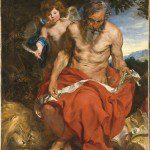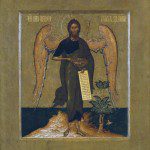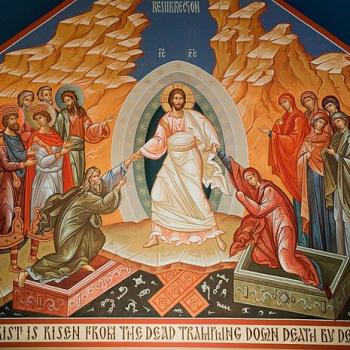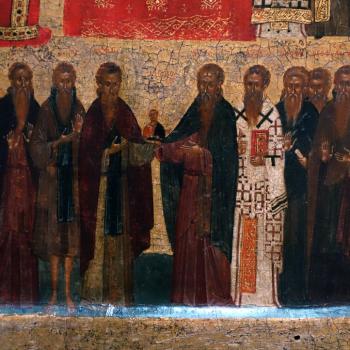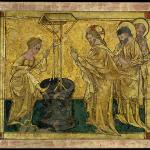Even after his fall, Athanasius held him in the greatest esteem. We read, for example, Athanasius briefly discussing this point in his “Defense of his Flight”:
Of the great Hosius, who answers to his name, that confessor of a happy old age, it is superfluous for me to speak, for I suppose it is known unto all men that they caused him also to be banished; for he is not an obscure person, but of all men the most illustrious, and more than this. When was there a Council held, in which he did not take the lead , and by right counsel convince every one? Where is there a Church that does not possess some glorious monuments of his patronage? Who has ever come to him in sorrow, and has not gone away rejoicing? What needy person ever asked his aid, and did not obtain what he desired? And yet even on this man they made their assault, because knowing the calumnies which they invent in behalf of their iniquity, he would not subscribe to their designs against us. And if afterwards, upon the repeated stripes above measure that were inflicted upon him, and the conspiracies that were formed against his kinsfolk, he yielded to them for a time, as being old and infirm in body, yet at least their wickedness is shown even in this circumstance; so zealously did they endeavour by all means to prove that they were not truly Christians.[1]
St. Athanasius clearly defined as Ossius as being great, despite the “yielding for a time” against his will to the torture he and his family suffered at the hands of Arians. Athanasius understood the weight of the blows and the infirmity of old age, and saw that what it caused Ossius to do did not remove his greatness, but rather demonstrated it because of how long he suffered and endured for the Christian faith. Indeed, Athanasius brought Ossius up in his History of the Arians, once again describing the torture and what it brought about, but also using it to demonstrate Ossius’s greatness:
But although they had done all this, yet these impious men thought they had accomplished nothing, so long as the great Hosius escaped their wicked machinations. And now they undertook to extend their fury to that great old man. They felt no shame at the thought that he is the father of the Bishops; they regarded not that he had been a Confessor ; they reverenced not the length of his Episcopate, in which he had continued more than sixty years; but they set aside everything, and looked only to the interests of their heresy, as being of a truth such as neither fear God, nor regard man. [2]
After describing Ossius’ initial resistance to the emperor, including his refusing to denounce Athanasius, Athanasius continued:
Such were the sentiments, and such the letter, of the Abraham-like old man, Hosius, truly so called. But the Emperor desisted not from his designs, nor ceased to seek an occasion against him; but continued to threaten him severely, with a view either to bring him over by force, or to banish him if he refused to comply. And as the Officers and Satraps of Babylon, seeking an occasion against Daniel, found none except in the law of his God; so likewise these present Satraps of impiety were unable to invent any charge against the old man (for this true Hosius, and his blameless life were known to all), except the charge of hatred to their heresy. They therefore proceeded to accuse him; though not under the same circumstances as those others accused Daniel to Darius, for Darius was grieved to hear the charge, but as Jezebel accused Naboth, and as the Jews applied themselves to Herod. And they said, ‘He not only will not subscribe against Athanasius, but also on his account condemns us; and his hatred to the heresy is so great, that he also writes to others, that they should rather suffer death, than become traitors to the truth. For, he says, our beloved Athanasius also is persecuted for the Truth’s sake, and Liberius, Bishop of Rome, and all the rest, are treacherously assailed.’ When this patron of impiety, and Emperor of heresy , Constantius, heard this, and especially that there were others also in the Spains of the same mind as Hosius, after he had tempted them also to subscribe, and was unable to compel them to do so, he sent for Hosius, and instead of banishing him, detained him a whole year in Sirmium. Godless, unholy, without natural affection, he feared not God, he regarded not his father’s affection for Hosius, he reverenced not his great age, for he was now a hundred years old ; but all these things this modern Ahab, this second Belshazzar of our times, disregarded for the sake of impiety. He used such violence towards the old man, and confined him so tightly, that at last, broken by suffering, he was brought, though hardly, to hold communion with Valens, Ursacius, and their fellows, though he would not subscribe against Athanasius. Yet even thus he forgot not his duty, for at the approach of death, as it were by his last testament, he bore witness to the force which had been used towards him, and anathematized the Arian heresy, and gave strict charge that no one should receive it.[3]
Ossius lapsed under pressure, and yet we can see how Athanasius, who looked up to Ossius as a mentor, exonerated him, realizing that what is done out of external force is not freely willed, and therefore not to be seen as imputing guilt. Certainly some heroic saints could suffer through such persecution and perish in it, and their martyrdom is to be recognized for the greatness found in it as well, but those who suffer as confessors for a long time also demonstrate a heroic virtue as well, even if they crack due to external pressure.
![By Abraham (Own work) [GFDL (http://www.gnu.org/copyleft/fdl.html) or CC BY 3.0 (http://creativecommons.org/licenses/by/3.0)], via Wikimedia Commons](https://wp-media.patheos.com/blogs/sites/637/2017/01/Japanese_Martyrs_of_1597_Katowice_Panewniki-300x225.jpg)
Rodrigues sees his duty is to be charitable to his flock, to love them and do what he can for their safety, and this in the end is what motivates him to be unselfish, to give up claims of personal holiness, and so to do as asked by the Japanese authorities. In the midst of the pain and suffering he is feeling, in the midst of all the confusion, he feels that Christ has even come to him to tell him that if he follows through with the demands of the Japanese nationalists, mercy and grace could still be his, because Christ’s death already took such sin into account and is meant to hold everyone up. Jesus was already stomped on by taking up the cross and it was what he came to do, to hold up all the sinners, all those who suffer and cannot stand on their own.
Too many take Endo was indicating apostasy is fine. This, however, was not the point; he was right in saying that if someone did apostatize, Jesus’ work on the cross has already taken it into consideration, and they can still receive mercy and grace from Jesus. They need not despair like Judas did, but see that their weakness was like Peter, a sin for a season which does not have to define them and make them necessarily hell-bound. This was the message of the Church in its rejection of the Novatians.
Moreover, we do not have to accept that Rodrigues really had Christ come to him, but rather, we can see it as what went on in his personal imagination; it can be seen as the vain imagination of a man broken down; there is grace in it, healing which is given to him through it, because it is based upon an aspect of truth, but we do not need to see it as being real and so indication of Jesus telling anyone to sin. We can add to it what Athanasius indicated: when someone is so broken that they lapse against their will, the guilt is not theirs, but those who break them down.
Silence therefore is a movie about humanity, about a priest who loves others thanks to his love for Christ, and gives us a reason to expect for mercy for such a man even if they are broken down because of that love. It is profound, but to take for granted the vision, the words he imagines Christ says, is to forget what is happening to him in his mind and body and so to ignore the whole point of how such mercy is revealed. It is the mercy which the earliest Christian martyrs always gave to their compatriots, to those who could not hold out to the end. For, as St. Jerome indicated, those who held out to the end are exceptional: “If anyone persecuted for confessing the Name [that is, of Christ] sees another person deny it under pain of torture, he should empathize with what the denier has suffered and be astonished not as much because anyone overcame him as because he overcame himself.”[4]
[1] St. Athanasius, “Defense of His Flight” in NPNF2(4):256.
[2] St. Athanasius, “History of the Arians” in NPNF2(4):284-5.
[3] Ibid., 286-7.
[4] St. Jerome, Commentary on the Galatians. trans. Andrew Cain (Washington, DC: Catholic University of America Press, 2010), 248.
Stay in touch! Like A Little Bit of Nothing on Facebook:
A Little Bit of Nothing


